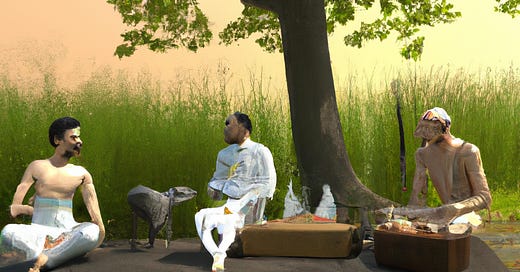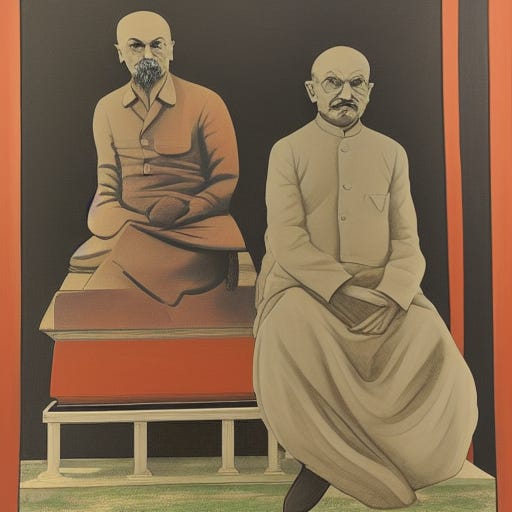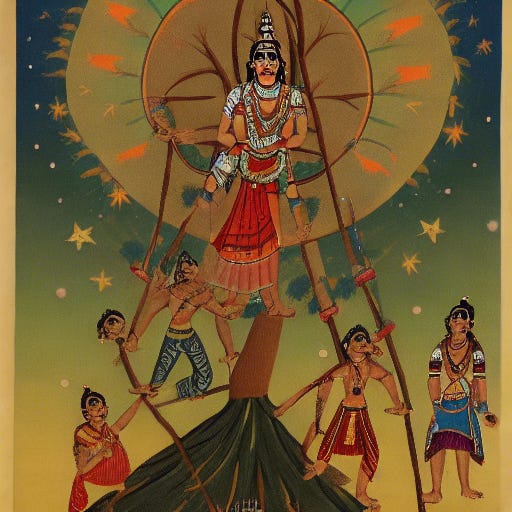TGL1: Tagore and Gandhi in the shadow of Lenin
The Highest Stage
Just before he launched the revolution that would make him immortal, Lenin wrote a book called “Imperialism, the Highest Stage of Capitalism.” Writing at a time when millions had just died on the fields of France and Belgium and Germany in the West and Austria-Hungary and Russia in the East, he believed capitalism would inevitably lead to conflict and war.
Why so: because capital can’t generate unending profits from local markets alone, especially if local labor can organize and extract concessions that reduce profit; on the flip side, local demand is too low to generate returns on financial capital. The two are seemingly contradictory, but only seemingly.
Anyway, the solution for both troubles remains the same: establish an area where violent control leads to lowered costs and higher profits such as in territories where the population can’t agitate for demands or when they happen, agitations can be put down with terror. That’s the reason why slave plantations and colonies were essential to that stage of capital.
Lenin was building upon the work of the British economist J.A. Hobson who recognized the same tendency during the Boer war - that mining interests were promoting the conflict - and wrote a book about it. Post WWII imperialism hasn’t promoted direct colonization; it’s cheaper to outsource the governance to pliant local elites. The phrase ‘Banana Republic’ comes from an American avatar of this phenomenon.
What Hobson and Lenin failed to anticipate - they couldn’t have - is that Capitalism’s (and much of Socialism’s!) dominance over space and time wouldn’t stop with imperialism; it’s true reach is planetary rather global. The natural resting place is complete control over the biological and geological processes of the planet, aka planetism. Planetism can take many forms:
Deepening of the current extractive model which will consume everything and collapse,
A hyperimperial Climate Leviathan,
A decentralized model of control powered by renewables and crypto
Some other system I can’t imagine.
What’s clear:
Planetism is the Highest State of Capitalism and the forest fire, the strip mined ocean and the factory farm are to this state as the colony was to what Lenin and Hobson were writing about.
PS: And even the Earth may not be enough - there’s always Mars, the rest of the Solar System and the stars beyond.
The only viable alternative to this regime of increasing control - in my view, if not yours - is a complete and total reorientation of the human relationship with the planet. I am not talking about a return to a mythical edenic past, or the complete abandonment of technological progress, but a thoroughgoing transformation of the very tools that have made us so successful and so destructive as species.
In short, rethinking the machine.
The Planet of Letters
This is where Tagore and Gandhi come into the picture, for they recognized that the modern system hides ecological violence behind a facade of civilization, and that this violence is a direct consequence of the ‘machine.’ Blake’s “Dark Satanic Mills” and Thoreau’s “Walden” are precursors, but their critique lay on the periphery of the capitalist metropole. Blake and Thoreau are heterodox in the best sense of that term, with all its advantages and liabilities. Tagore and Gandhi were attempting a different creative act: bringing the resources of an entire civilization (the Indian) to bear on the same problem and doing so from the core rather than the periphery of that civilization. They weren’t (ultimately) successful, and today’s India is a repudiation of everything they stood for, but the promise remains:
Is there such a thing as Bhudharma, the dharma of the planet?
We won’t know the answer unless we try. Next stop: some books to guide our way out of the promised land. I will be reading this book in a planetary frame:
The Mahatma and The Poet: Letters and Debates between Gandhi and Tagore 1915-1941
Along with a recent commentary on that exchange:
&& some of Tagore and Gandhi’s own works. && while we are at it, why not add Lenin to the mix, making it into an anti-imperial triangle. In reading this trio, it’s important we abstract ourselves from two simultaneous intellectual traps:
Too much emphasis on today’s battles - we are barely scratching the surface of the planetary and we shouldn’t define what that means prematurely.
Too close an identification with the triangle’s historical milieu, i.e., the high noon of imperialism.
Imagine being a dog accompanying the trio as they sit down for lunch during a riverside picnic in the Metaverse. He’s loitering and listening as their trialog unfolds. So should we.







